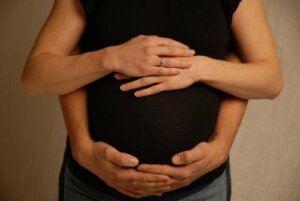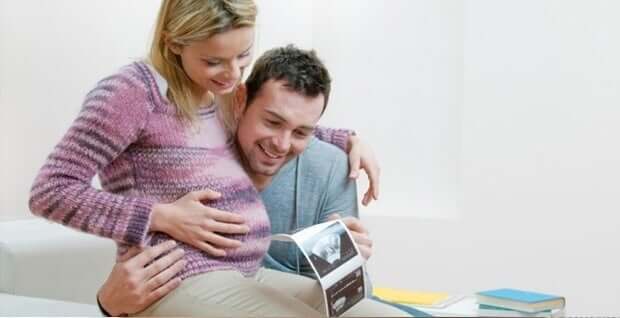11 Things Men Should Do if They Want to Have a Baby


Written and verified by the psychopedagogue María José Roldán
Normally, when a couple begins to think about trying to get pregnant, the woman is the one that makes the most changes regarding her health and lifestyle because this will increase her fertility and her chances of conceiving. But men also have an important role in all this.
There are many factors that affect a woman’s fertility, but men must also prepare for their women to conceive.
Things men should do if they want to have a baby
Give up smoking
Cigarettes are full of harmful toxins, and none of these toxins are good for the adult body, much less the developing cells and reproductive organs responsible for creating life.
A woman who smokes during pregnancy is dangerous, but a man may be affecting his reproductive cells when he’s trying to conceive.
Don’t drink as much caffeine
Studies show that men who take more than 265 milligrams of caffeine per day have significantly reduced fertility.
To put that into perspective, a short shot of espresso contains about 100 milligrams of caffeine. This means that it’s better to leave caffeine aside if you want to be a father and opt for other drinks that don’t affect your fertility.

Take vitamins
Women take folic acid in their diet to get pregnant (sometimes in pill form), but in men, a lack of folic acid in their diet can increase the chance of having abnormal chromosomes in the developing fetus.
Men also need to supplement their diet with vitamins and foods rich in folic acid to have a better chance of having a healthy baby.
Sleep well and exercise
Stress affects both men and women very negatively in many different areas of life. When you want to start a family, you can also have feelings of stress.
Exercising and maintaining good sleep routines in men will help ensure that the sperm are more likely to be active and ready to fertilize the egg.
Beware of stress
As we’ve just pointed out in the previous point, stress affects both men and women in different ways, but stress can be a negative factor in men when it comes to conceiving.
It’s possible for stress to wreak havoc on sexual relationships, and therefore, it’s more difficult to conceive a baby. Finding methods of physical and mental relaxation is essential to calming the stressed mind. Relaxation will help you feel better.
Stay on top of ovulation
The woman will control when her most fertile time is so that she can try to conceive on those days, but the man must also participate in being informed about the female fertile days.
This way, the woman will feel supported and understood at all times and the man will feel part of something as special as knowing the fertile days to conceive a precious baby.

Put alcohol aside
It’s best to avoid alcohol altogether, but believe it or not, both men and women can have a glass of wine or beer even if they want to start a family. What isn’t recommended is drinking alcohol on a regular basis.
Not drinking alcohol for a while may seem hard, but it’s the most brilliant idea to be able to try to conceive a baby.
See your doctor regularly
You can’t miss medical check-ups to find out how you are regarding your state of health. Men think that only women should go to the doctor when it comes to conceiving, but men also need to make sure they’re in good health so that they’ll be more likely to conceive. Your doctor can give you tips to increase your male fertility.
When a man and a woman want to have children, they should both go to the doctor’s office, because family planning isn’t just for women.
The man also has an active role in the whole process. A pregnant woman must have additional care, but the man shouldn’t be exempt from the entire process.
Normally, when a couple begins to think about trying to get pregnant, the woman is the one that makes the most changes regarding her health and lifestyle because this will increase her fertility and her chances of conceiving. But men also have an important role in all this.
There are many factors that affect a woman’s fertility, but men must also prepare for their women to conceive.
Things men should do if they want to have a baby
Give up smoking
Cigarettes are full of harmful toxins, and none of these toxins are good for the adult body, much less the developing cells and reproductive organs responsible for creating life.
A woman who smokes during pregnancy is dangerous, but a man may be affecting his reproductive cells when he’s trying to conceive.
Don’t drink as much caffeine
Studies show that men who take more than 265 milligrams of caffeine per day have significantly reduced fertility.
To put that into perspective, a short shot of espresso contains about 100 milligrams of caffeine. This means that it’s better to leave caffeine aside if you want to be a father and opt for other drinks that don’t affect your fertility.

Take vitamins
Women take folic acid in their diet to get pregnant (sometimes in pill form), but in men, a lack of folic acid in their diet can increase the chance of having abnormal chromosomes in the developing fetus.
Men also need to supplement their diet with vitamins and foods rich in folic acid to have a better chance of having a healthy baby.
Sleep well and exercise
Stress affects both men and women very negatively in many different areas of life. When you want to start a family, you can also have feelings of stress.
Exercising and maintaining good sleep routines in men will help ensure that the sperm are more likely to be active and ready to fertilize the egg.
Beware of stress
As we’ve just pointed out in the previous point, stress affects both men and women in different ways, but stress can be a negative factor in men when it comes to conceiving.
It’s possible for stress to wreak havoc on sexual relationships, and therefore, it’s more difficult to conceive a baby. Finding methods of physical and mental relaxation is essential to calming the stressed mind. Relaxation will help you feel better.
Stay on top of ovulation
The woman will control when her most fertile time is so that she can try to conceive on those days, but the man must also participate in being informed about the female fertile days.
This way, the woman will feel supported and understood at all times and the man will feel part of something as special as knowing the fertile days to conceive a precious baby.

Put alcohol aside
It’s best to avoid alcohol altogether, but believe it or not, both men and women can have a glass of wine or beer even if they want to start a family. What isn’t recommended is drinking alcohol on a regular basis.
Not drinking alcohol for a while may seem hard, but it’s the most brilliant idea to be able to try to conceive a baby.
See your doctor regularly
You can’t miss medical check-ups to find out how you are regarding your state of health. Men think that only women should go to the doctor when it comes to conceiving, but men also need to make sure they’re in good health so that they’ll be more likely to conceive. Your doctor can give you tips to increase your male fertility.
When a man and a woman want to have children, they should both go to the doctor’s office, because family planning isn’t just for women.
The man also has an active role in the whole process. A pregnant woman must have additional care, but the man shouldn’t be exempt from the entire process.
All cited sources were thoroughly reviewed by our team to ensure their quality, reliability, currency, and validity. The bibliography of this article was considered reliable and of academic or scientific accuracy.
- Al-Turki, H. A. (2015). Effect of smoking on reproductive hormones and semen parameters of infertile Saudi Arabians. Urology annals, 7(1), 63-66. https://journals.lww.com/urol/Fulltext/2015/07010/Effect_of_smoking_on_reproductive_hormones_and.13.aspx
- Álvarez, C. (2018). Mesa y reproducción: la gran metáfora que vincula dieta y fertilidad masculina. Trabalhos de Antropologia e Etnologia, 58. Pp. 279-299. https://eprints.ucm.es/id/eprint/49607/
- Armas, E., Mosquera, M., Alvarez, K., Rodríguez, M., Duartes, D. y Guerra, M. (2022). Relación entre los factores de riesgo de infertilidad masculina y las alteraciones del espermograma. Revista de Ciencias Médicas de Pinar del Río, 26(2), 1-9. http://ref.scielo.org/rxrgvn
- Arqué, M. (2019). Estudio piloto sobre la influencia de la dieta y el estilo de vida en los resultados de la FIV/ICSI. [Trabajo de Fin de Grado, Universidad de Barcelona]. Depósito Digital de Documentos de la UAB. https://ddd.uab.cat/record/240698
- Barik, G., Chaturvedula, L. & Bobby, Z. (2019). Role of oxidative stress and antioxidants in male infertility: An interventional study. Journal of human reproductive sciences, 12(3), 204. https://www.jhrsonline.org/article.asp?issn=0974-1208;year=2019;volume=12;issue=3;spage=204;epage=209;aulast=Barik
- Cilio, S., Rienzo, M., Villano, G., Mirto, B. F., Giampaglia, G., Capone, F., … & Crocetto, F. (2022). Beneficial effects of antioxidants in male infertility management: A narrative review. Oxygen, 2(1), 1-11. https://www.semanticscholar.org/paper/Beneficial-Effects-of-Antioxidants-in-Male-A-Review-Cilio-Rienzo/7b2ee335a28a0fa919b32f79c9bdd5a26ef1c12a
- Del Mazo, J. (2020, 26 de febrero). La contaminación silenciosa que nos está robando la fertilidad. The conversation. Consultado el 8 de abril de 2023. https://theconversation.com/la-contaminacion-silenciosa-que-nos-esta-robando-la-fertilidad-131070#:~:text=Cada%20a%C3%B1o%20la%20calidad%20y,diferentes%20%C3%A1reas%20geogr%C3%A1ficas%20del%20planeta.
- Giraldo, A. (2017). La fertilidad masculina, el zinc y los ácidos grasos. [Trabajo de Fin de Grado, Universidad de Valladolid]. Repositorio institucional. https://uvadoc.uva.es/handle/10324/24987
- González, N. I. (2022). Influencia del estilo de vida en la fertilidad: una revisión sistematizada de la literatura. [Trabajo de Fin de Grado, Universitat de Lleida]. Repositorio institucional. https://repositori.udl.cat/items/271ed121-d44c-4064-9779-940150f77e8d
- González, L. G., López, A. M., Perea, J. M. y Ortega, R. M. (2018). Nutrición y fertilidad. Nutrición hospitalaria, 35(6), 7-10. https://scielo.isciii.es/scielo.php?script=sci_arttext&pid=S0212-16112018001200003
- Mallok, A., Flores-Sánchez, R. M., Alonso-Rodríguez, C. Á. y Martínez-Sánchez, G. (2011). Desbalance redox en la infertilidad masculina. Revista Cubana de Farmacia, 45(2), 283-296. http://ref.scielo.org/38vkm6
- Martínez, B. C. (2015). Medicamentos como posible factor asociado a la infertilidad masculina. Farmacéuticos comunitarios, 7(3), 23-41. https://www.raco.cat/index.php/FC/article/view/320925
- Metro, D., Cernaro, V., Santoro, D., Papa, M., Buemi, M., Benvenga, S. & Manasseri, L. (2017). Beneficial effects of oral pure caffeine on oxidative stress. Journal of Clinical & Translational Endocrinology, 10, 22-27. https://pubmed.ncbi.nlm.nih.gov/29204368/
- Nargund, V. H. (2015). Effects of psychological stress on male fertility. Nature Reviews Urology, 12(7), 373-382. https://pubmed.ncbi.nlm.nih.gov/26057063/
- Ojeda, M. B. G., Isa, L., Poch, F., Argibay, S. G. y Young, E. (2021). De esto no se habla: Los tratamientos de fertilidad y su impacto en la sexualidad de las parejas. Revista Reproducción, 36(1), 1-10. http://www.revistareproduccion.org.ar/index.php/revistareproduccion/article/view/10
- Ricci, E., Viganò, P., Cipriani, S., Somigliana, E., Chiaffarino, F., Bulfoni, A. & Parazzini, F. (2017). Coffee and caffeine intake and male infertility: a systematic review. Nutrition journal, 16, 1-14. https://nutritionj.biomedcentral.com/articles/10.1186/s12937-017-0257-2
- Rodríguez, Á. D. (2019). Influencia de los hábitos de consumo y el deporte en la fertilidad masculina: diseño experimental. [Trabajo de Fin de Grado, Universidad de La Laguna]. RIULL-Repositorio institucional. https://riull.ull.es/xmlui/handle/915/14729
- Schuchowsky, E., Schaefer, D., Salvador, R. A., do Nascimento, A. E., Til, D., Senn, A. P. & Amaral, V. L. L. (2017). Effects of energy drinks on biochemical and sperm parameters in Wistar rats. Nutrire, 42(22), 1-7. https://link.springer.com/article/10.1186/s41110-017-0047-9
This text is provided for informational purposes only and does not replace consultation with a professional. If in doubt, consult your specialist.








